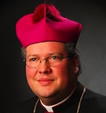
Prime Bishop Anthony Mikovsky
Lenten Encounter with Christ
As we now find ourselves within the season of Great Lent, we are given many opportunities to come into closer and closer contact with the life, and especially the passion and death, of our Lord Jesus Christ. During this season we will walk the Stations of the Cross as we gather together for them within our parish churches. We will also reflect on these events when we celebrate Bitter Lamentations and other penitential devotions. But within the first two weeks of the Lenten season, we also take some time to join with our Lord and Savior Jesus Christ, as He prepares Himself to go to Jerusalem where this journey of the Passion will come to its completion. It is important that we walk this portion of the journey along with Jesus as well, since in this Lenten journey we gain strength for the journey of our own lives in striving to unite them to Jesus.
On the First Sunday of Lent, the reading from Saint Luke’s Gospel is Jesus being tempted in the desert by the devil. This is a well attested event within the life of our Lord since it appears within all three of the synoptic Gospels, Matthew, Mark and Luke. Following the baptism of Jesus by John the Baptist in the River Jordan, He goes to the desert where He fasts and communes with His Father. For the Jewish people, the desert was certainly a place where you come into contact with the divine. And during this contact, you confront the challenges to your connection with God.
The Gospel reads: “Jesus, full of the Holy Spirit, returned from the Jordan and was led by the Spirit in the wilderness, where for forty days He was tempted by the devil. He ate nothing at all during those days, and when they were over, He was famished. The devil said to Him, ‘If you are the Son of God, command this stone to become a loaf of bread.’ Jesus answered him, ‘It is written, “One does not live by bread alone.”’”
“Then the devil led Him up and showed Him in an instant all the kingdoms of the world. And the devil said to Him, ‘To You I will give their glory and all this authority; for it has been given over to me, and I give it to anyone I please. If you, then, will worship me, it will all be yours.’ Jesus answered him, ‘It is written, “Worship the Lord your God, and serve only Him.”’”
“Then the devil took Him to Jerusalem, and placed Him on the pinnacle of the temple, saying to Him, ‘If you are the Son of God, throw Yourself down from here, for it is written, “He will command His angels concerning You, to protect You,” and “On their hands they will bear You up, so that You will not dash Your foot against a stone.”’ Jesus answered him, ‘It is said, “Do not put the Lord your God to the test.”’ When the devil had finished every test, he departed from Him until an opportune time.” (Luke 4:1-13)
We see here only three specific temptations, but from the last sentence, we can assume that Jesus faced “every test” that was put to Him. We also notice that these temptations dealt with taking some easy way around the commandments of God, to accomplish through some shortcut, what Jesus had set out to do. We take from this that through the entire ministry of Jesus, He followed fully the commands and way set forward by His heavenly Father. And He did this from this moment until He prayed: “Not My will, but Yours be done,” (Luke 22:42) on the evening before His crucifixion.
In seeking to travel our own desert journey during this Lenten season, we see that Jesus has shown us that temptations are conquered by turning to the saying of God in Scripture as Jesus did. When the temptations come, Jesus sets out the way, the desire and plan of God for all of us, His people. This certainly is a Lenten lesson that we must take to heart to guide us, not only in our Lenten journey, but in our entire journey through life. The lessons are: “Be sustained by the presence of God, serve Him alone, and fully trust in His way.”
In the Gospel reading of the second Sunday in Lent we find our Lord in another place of connection with God: the mountain. The mountain is the place where Moses encountered God in the giving of the tablets of the Law and it is where Elijah encountered God as the still small voice. While Jesus is at prayer, He becomes transfigured and His disciples, Peter, John and James, witness the glory of God on the face of Jesus.
The Gospel reads: “Jesus took with Him Peter and John and James, and went up on the mountain to pray. And while He was praying, the appearance of His face changed, and His clothes became dazzling white. Suddenly, they saw two men, Moses and Elijah, talking with Him. They appeared in glory and were speaking of His departure, which He was about to accomplish at Jerusalem. Now Peter and his companions were weighed down with sleep; but since they had stayed awake, they saw His glory and the two men who stood with Him. Just as they were leaving Him, Peter said to Jesus, ‘Master, it is good for us to be here; let us make three dwellings, one for You, one for Moses, and one for Elijah’ – not knowing what he said. While he was saying this, a cloud came and overshadowed them; and they were terrified as they entered the cloud. Then from the cloud came a voice that said, ‘This is My Son, My Chosen; listen to Him!’ When the voice had spoken, Jesus was found alone.” (Luke 9:28-36)
This Gospel reading shows forth the other aspect of our moments of connection with God. Within them we can behold the glory of God on the face of Jesus. We also see here the primacy of following Jesus. Jesus is found conversing with Moses, who represents the giving of the Law, and Elijah, who shows forth the prophetic tradition. For the people of Israel, the primary way in which God was encountered is through the Law and the Prophets, but here we see something that goes beyond. Moses and Elijah are there speaking with our Lord and they bring forth the importance of the exodus of Jesus, His Passion and Death, that will be accomplished in Jerusalem. But then the cloud comes, another sign of the presence of God, but the voice points beyond the tradition of Law and Prophets, to Jesus Himself. The voice of God says, “This is My Son, My Chosen; listen to Him!” (Luke 9:35)
So we see here, dear brothers and sisters, that during our Lenten journey we must direct all of our attention to Jesus. We must hear His words and His teachings. We must, as we have been instructed, “Listen to Him!” But we must also know, especially as Polish National Catholics that honor the proclamation of God’s Word as a sacramental experience, that Jesus not only speaks the Word of God, but He Himself is the Word of God. To listen to Jesus then, is not only following His teachings, but it goes beyond this to acknowledge Him as the Word of God made flesh, knowing that listening to Him, means entering ever more fully into the entire life of our Lord Jesus Christ.
This truly must be our desire for this present season of Great Lent. Not only to honor this time of the Passion and Death of our Lord, not only to be thankful that Jesus went to the Cross for our salvation, but that during this season Jesus will take full possession of our entire lives. We must say with John the Baptist, “The friend of the bridegroom, who stands and hears Him, rejoices greatly at the bridegroom’s voice. For this reason my joy has been fulfilled. He must increase, but I must decrease.” (John 29b-30)
Although we know that this season of Lent is one of sorrow at the Passion and Death of Jesus, let it also be the season through which our joy will be fulfilled. True joy at being united fully with Jesus, truly and fully listening to and trusting Jesus, the Word of God made flesh. And then through our Lenten disciplines, let us all seek to have the life of Christ increase in us, and our own sins and selfishness decrease.

